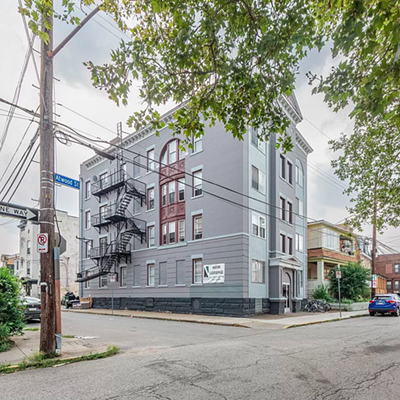At UPMC-East, UPMC's $250 million Monroeville hospital, the floors are terrazzo, flecked with marble. Patients' rooms have 42-inch TVs, and "smart glass" doors that can become opaque or transparent with the touch of a button. You can check your email from bed, or take a shower in a stall that, as one worker told the Pittsburgh Tribune-Review during a recent media preview, is "bigger than the one in my house."
Wow. I don't know about you, but I can't wait to suffer a debilitating medical condition!
Excitement about the soon-to-open facility, though, has been muted, considering hospitals are supposed to be our 21st-century steel mills. The Trib story revisited a 2011 investigative report, which found that hospitals nationwide were "spending billions on large new facilities in a medical arms race" that was driving up health-care costs. The Pittsburgh Post-Gazette led with UPMC executives insisting that the new facility was not — repeat not — intended to compete with Forbes Regional Hospital, which stands a half-mile away and may be acquired by Highmark, UPMC's ally-turned-enemy.
"It wasn't about them," one exec insisted. "It was about our patient base," which will no longer have to travel to UPMC facilities in Pittsburgh.
That may spare patients the arrhythmia-inducing prospect of negotiating city streets. Beyond that, though, maybe we should be wary of the health impact.
Americans already spend far more than any other country on health care — nearly $8,000 per person per year, while few other nations spend more than $5,000 per person. Yet when measured by factors like life expectancy, the results are mediocre. And in a landmark 2009 New Yorker story, Atul Gawande noted studies showing that patients who received more aggressive medical treatment "did no better than other patients," either in terms of outcomes "or satisfaction with the care." (In fairness, those in the study group may not have had 42-inch TVs.)
Skeptics see a case of supply driving demand: Once a facility adds beds, or a new MRI, it has financial incentives to use them. Which is why state Sen. Jim Ferlo (D-Lawrenceville) has proposed requiring a "Certificate of Need" for any major investment in new medical buildings or technology. Ferlo's bill, SB 1542, would create a review board — made up of medical professionals, economists, citizens and officials — to ensure new facilities serve a community purpose.
In a statement, Ferlo said the measure was necessary because of the UPMC/Highmark conflict, which he predicted would become "a protracted war that will cost consumers billions."
Ferlo now faces a fight of his own. Certificates of Need are used in most states, and Pennsylvania once required them too. But in 1992, before Pennsylvania's program lapsed, a report compiled for the legislature found that certificates "did not slow the rise in total hospital costs" here or elsewhere. Instead, officials should pursue "stringent control of hospital and physician rates," or promote "increased market competition."
But Republicans, who run Harrisburg, are opposed to the former ... and even they sometimes fear the consequences of the latter. Last year, when UPMC wanted to drop Highmark insurance from its network — citing the virtues of competition — Gov. Tom Corbett forced Highmark and UPMC to extend their contract.
Still, as an old UPMC ad would have it ... the competition continues. Forbes Regional has launched its own expansion, while Highmark hatches its own expansion plans. Customers themselves — most of whom have insurance chosen by their employers — have little say about it, and little means of judging who actually provides the best care. By the time they need health care, it's often too late to worry about the color of the drapes.
"UPMC-East shows why a Certificate of Need program is necessary," says Neal Bisno, president of SEIU Healthcare PA. "Is it in our interest to pay for an unnecessary institution, simply because it's in the interest of a large health-care system?"
The irony about making hospitals feel like hotels — UPMC even boasts of offering "concierges" — is that unlike a hotel guest, you have little choice about where, or how long, you stay. The cost, and effectiveness, of care are far less transparent than "smart glass." So you get to make any decision you want — all those channels on TV! meals you can order like room service! — except those that really matter.














